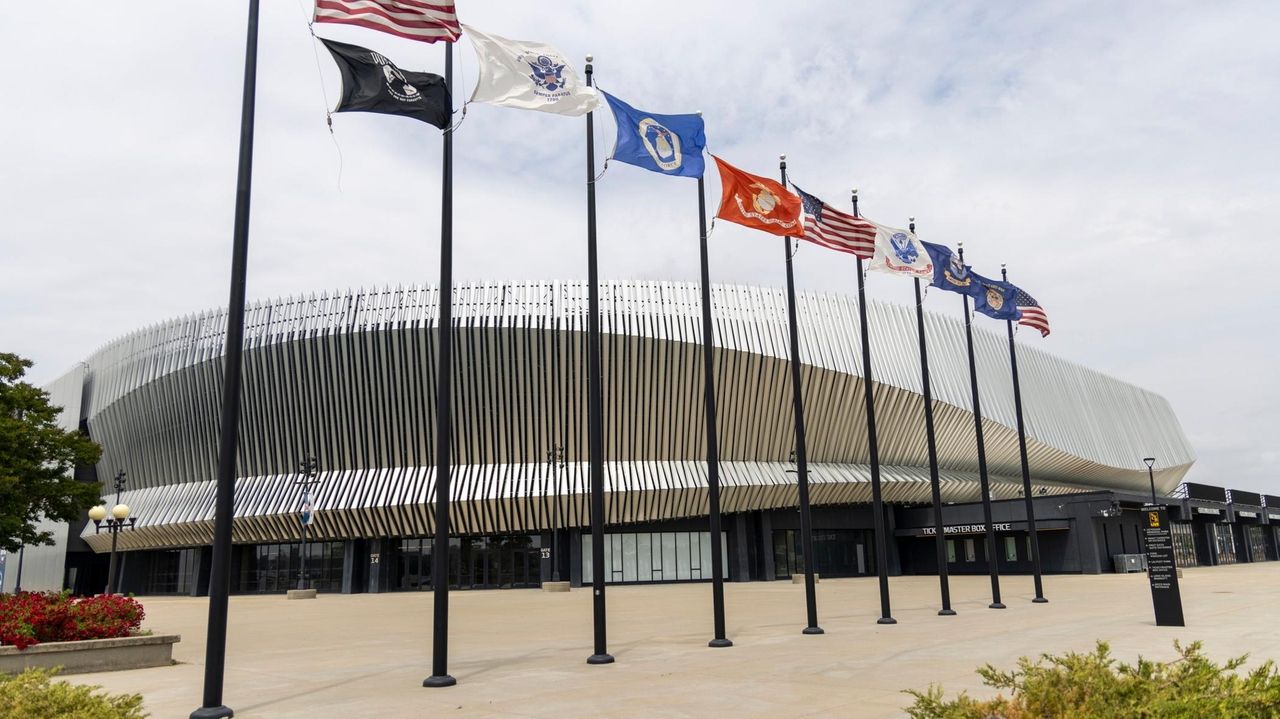New York Senate Approves Bill to Boost Mets’ Owner’s Casino Hopes
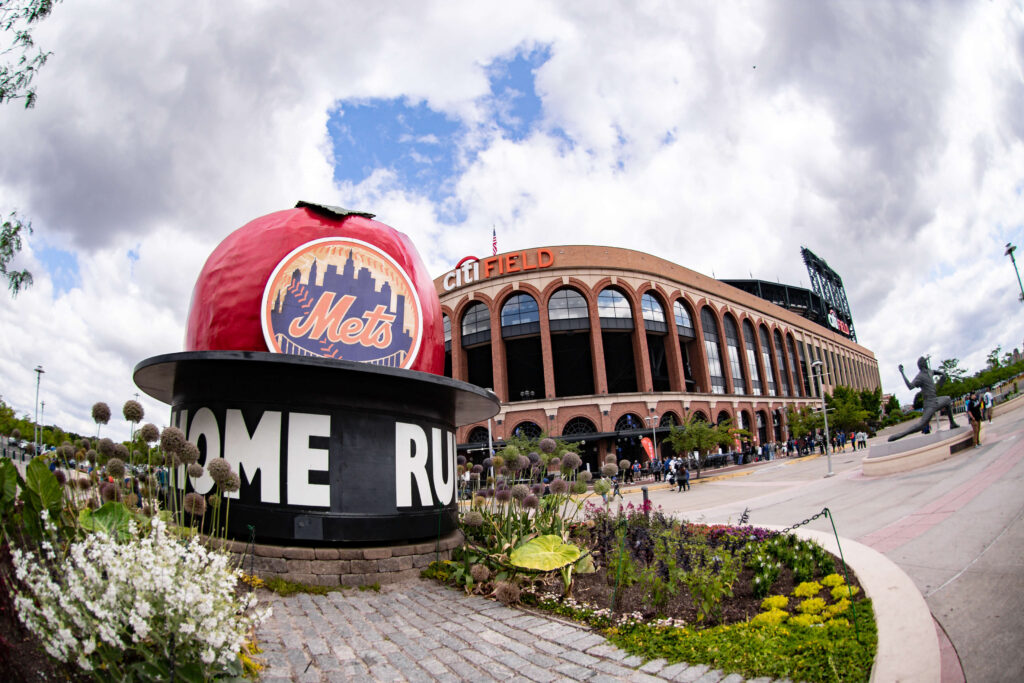
The state Senate voted to let New York City change the classification of 50 acres of parking lots around the Mets’ Citi Field, clearing a roadblock for owner Steve Cohen’s plans for a casino there. May 29, 2025 • 16:26 ET • 4 min read Photo By – Imagn Images. The New York Senate voted 54-5 to let New York City change the classification of 50 acres of parking lots around the Mets’ Citi Field, clearing a roadblock for Mets’ owner Steve Cohen to build a casino there. Cohen is applying for one of three licenses available for commercial casinos. Key takeaways The Senate approved legislation allowing parking lots to be reclassified around Citi Field after getting Assembly approval earlier in May. The motion now waits for Gov. Kathy Hochul’s approval or veto. Cohen plans to build an $8 billion casino resort with Hard Rock International on the land, which will include an entertainment district and park. The land where Citi Field parking lots currently stand is classified as public parkland. Therefore, New York City must “alienate” the parkland before a private project like the Citi Field casino project can proceed. Senate Bill S7121A, which received approval from the Assembly and Senate, requires Cohen and Hard Rock to develop at least 20 acres into a public park. Cohen and Hard Rock International’s proposal is to build an $8 billion casino resort and entertainment complex. The plans also include a proposal for a public park. “After years of community engagement, thousands of conversations, and the leadership of our local elected officials, we are one step closer to transforming these asphalt lots into something our neighbors can truly be proud of,” Cohen said. New York online casinos are not legal, so land-based casinos are the only way to gamble. Currently, the only casinos in New York are upstate. Competition for New York casino licenses heats up While this is a win for the Cohen-Hard Rock proposal, it’s far from the only contender. Several plans are under consideration for the three commercial casino licenses available in downstate New York. Earlier this year, New York State Gaming Commission executive director Robert Williams confirmed financial benefits will play a key role in determining which proposal receives approval from the state’s gambling regulator. The competition is thinning out after Wynn Resorts withdrew its plan from the running. The company cited “persistent opposition” to its Hudson Yards West project. Before that, Las Vegas Sands dropped out of the race with its Nassau Coliseum on Long Island proposal. Other operators remain in, like Caesars Entertainment, bidding with rapper Jay-Z’s Roc Nation. That plan imagines a casino built in Times Square. Meanwhile, Resorts World, the Genting Group, and MGM Resorts are all in the running. The proposal deadline is June 27, with winning bids confirmed at the start of December. Pages related to this topic Source link
Bulgaria’s Casino Industry in 2025: A Quiet Powerhouse in European Gambling | Clash Magazine & Concert Tickets

While many eyes are focused on hotspots like Las Vegas or Monaco, Bulgaria has steadily become one of Europe’s most underrated casino destinations. With a blend of attractive legislation, well-designed gaming environments, and a surge in digital gambling platforms, Bulgaria is fast earning recognition from casino tourists and serious players alike. The country’s approach to gambling regulation, affordability, and technological adoption has made it a preferred location for both operators and visitors, especially from neighboring countries. Whether you’re walking into a grand resort in Sofia or spinning the reels on your phone from a beachside café in Varna, Bulgaria offers a gambling experience that feels both modern and relaxed. The Legal Landscape: Built for Safety and Growth Gambling in Bulgaria is legal and tightly regulated. The National Revenue Agency (NRA) serves as the official body responsible for overseeing all gambling activity. Its role includes licensing, enforcing compliance, and promoting responsible gambling standards. Thanks to its transparent licensing process, Bulgaria has attracted both domestic investors and well-known international operators. Casino licenses are issued to companies that meet financial and technical requirements, and online platforms must host their servers within the European Union, adding another layer of regulatory reliability. This clear-cut framework has allowed the Bulgarian gambling industry to grow without falling into disarray or over-saturation. Casinos You Can Visit in Bulgaria Bulgaria’s land-based casinos are found throughout the country, but three cities stand out for their concentration and variety: Sofia As the capital, Sofia is home to some of the largest and most luxurious venues in the country. Places like Palms Royale Sofia and Efbet Casino offer full suites of games, including poker rooms, high-limit tables, and hundreds of slot machines. Varna Located along the Black Sea, Varna has several casino resorts catering to tourists looking to mix beach vacations with gaming excitement. Many venues here are part of hotel complexes that include spas, restaurants, and nightclubs. Plovdiv A cultural hub with ancient Roman ruins and a vibrant arts scene, Plovdiv offers a more low-key casino experience. Casinos here are typically smaller but provide all the standard games—plus a strong local flavor. Casinos in Bulgaria are generally open 24/7 and serve drinks and snacks to active players. Most allow tourists to play with just a passport, and betting minimums are far more affordable than in Western Europe. The Online Casino Boom If land-based gambling has a strong presence, the online casino industry in Bulgaria has exploded in the last five years. With faster internet speeds, better mobile devices, and a tech-savvy population, online casinos are now a key part of the Bulgarian gambling experience. Licensed operators in Bulgaria are legally allowed to offer a wide range of games, including: Online slots (classic and video) Live dealer games Online poker rooms Roulette, blackjack, and baccarat Sports betting integrated with casino platforms Platforms like bgcasinos.net help players quickly identify trustworthy and licensed online casinos. These resources include comparison tools, reviews, and bonus guides—all essential for both new and experienced gamblers navigating the digital space. What Makes Bulgarian Casinos Stand Out? Several characteristics make Bulgaria unique in the European casino scene: Affordability: Compared to Western Europe, minimum bets, hotel stays, and food costs are lower, offering a better value for the same quality of experience. Multilingual Support: Many casinos cater to English, Russian, and Turkish speakers, given the high volume of international visitors. Flexible Payments: Bulgarian platforms accept traditional cards, digital wallets like Skrill and Neteller, and local systems such as EasyPay and ePay.bg. Responsible Play: Operators are legally required to offer self-exclusion, set spending limits, and publish responsible gaming links prominently. Trends to Watch in 2025 and Beyond The Bulgarian casino industry continues to innovate. Some of the emerging trends include: Crypto-accepting platforms: A small but growing number of online casinos are experimenting with accepting Bitcoin and Ethereum. AR and VR-enhanced gaming: Virtual environments are being tested by a few operators to offer more immersive play. Tourism-casino bundles: Hotels are creating package deals that combine sightseeing, spa access, and casino credit. Cross-border marketing: Casinos in Bulgaria are increasingly targeting visitors from Romania, Israel, Turkey, and Greece with region-specific promotions. As the regulatory environment remains stable, these innovations are expected to drive continued growth. Source link
SC Gaming casino named Happy Valley Casino — CDC Gaming
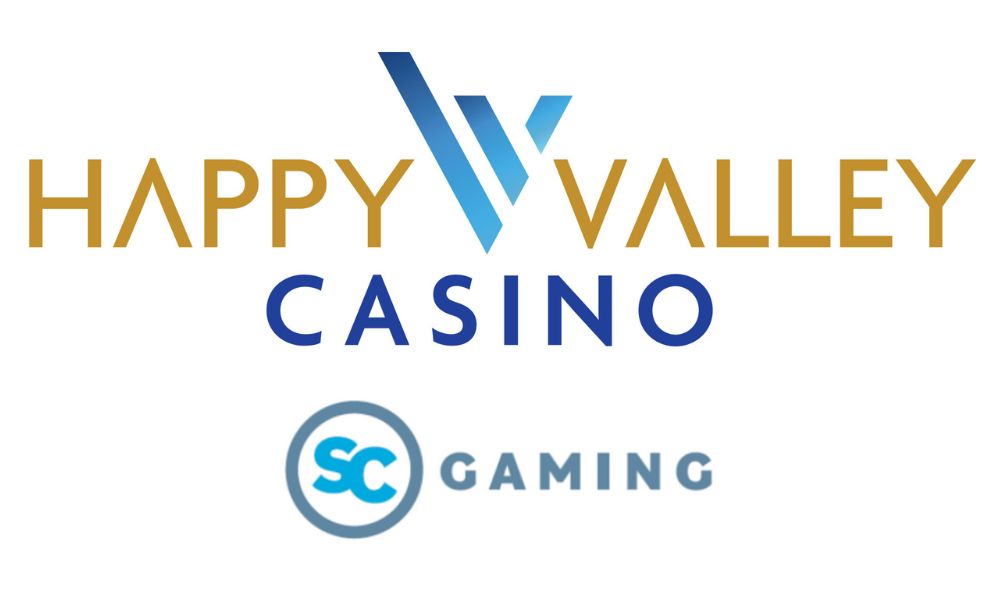
SC Gaming on Thursday announced the official name and logo of its forthcoming casino in central Pennsylvania at Nittany Mall in State College: Happy Valley Casino. According to a statement, the logo reflects a “modern vision and spirit of the future casino, while incorporating visual nods to the iconic valleys and mountains of the region.” “We feel that the name and logo pays homage to the rich history, picturesque landscapes and enduring spirit of the Happy Valley community that we are proud to be a part of,” SC Gaming CEO Eric Pearson said in the statement. Construction of the casino is expected to be finished by spring 2026. State College company Poole Anderson Construction is the general contractor. “The project is off to a great start and we’re confident that once it is completed, we’ll deliver a premier experience focusing on fun, excitement and hospitality that compliments Happy Valley and serves as a catalyst for further exciting development of the Dale Summit region around the Nittany Mall,” said Pearson. In January, SC Gaming announced it had entered into a framework agreement with Saratoga Casino Holdings to partner on the State College project, subject to pending regulatory approvals by the Pennsylvania Gaming Control Board. Also subject to all gaming approvals, Happy Valley Casino will include up to 750 slot machines, 30 table games, a full-service restaurant, and a quick-serve dining option. SC Gaming is owned and led by Ira Lubert, a businessman, investor, and philanthropist who also has developed the Valley Forge Casino Resort in King of Prussia, Pennsylvania. Source link
Casino Smoking Ban Winning Broad Support
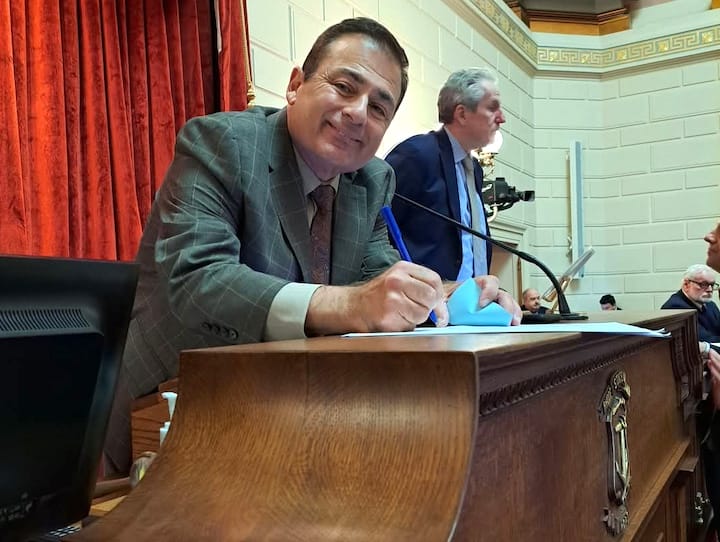
[CREDIT: Vanessa Baker] House Speaker Joe Shekarchi (D- Dist. 23, Warwick) signs the Casino smoking ban bill March 20 at the State House. [CREDIT: Courtesy Photo] Members of Casino Employees Against Smoking Effects (C.E.A.S.E. RI) and several unions rallied in the State Capitol May 20 supporting a casino smoking ban bill, which has the support of House Speaker Joe Shekarchi. STATE HOUSE — A week after members of Casino Employees Against Smoking Effects (C.E.A.S.E. RI) and unions rallied in the State Capitol backing a casino smoking ban, the bill remains on co-sponsor Speaker Joe Shekarchi ‘s (D- Dist. 23, Warwick) mind. “I have co-sponsored the casino smoking ban and I met again today with Rep. Teresa Tanzi (D – Dist. 34 Narragansett, SK), who is the sponsor, to further discuss the issue. The bill is part of the negotiations as we finalize legislative actions in the closing weeks of our session,” Shekarchi wrote Wednesday when asked how the legislation is faring under the dome. The Casino Smoking Ban bill, H 5464, repeals the exemption granted to pari-mutuel (pool betting) facilities and casinos from the smoke free workplace requirement and provides for a one time appropriation of $1,000,000 to inform patrons of the smoke-free policy. Tanzi said the legislation is waiting a vote to move it out of committee, with a change. ‘We have heard the bill on the House side and I am awaiting the bill coming up for a vote out of the Finance Committee, minus the money for marketing,” Tanzi said Tuesday. Casino Smoking Ban Bill Popular in House, Senate House Minority Leader Mike Chippendale, (R – Dist. 40 Coventry, Foster, Glocester), is also a co-sponsor. Aside from cosponsors, the bill enjoys wide support in both General Assembly chambers, said Vanessa Baker, iGaming Manager at Bally’s Twin River Casino and founder of C.E.A.S.E. RI’s Lincoln Chapter. Fifty-five of 78 Representatives support the bill, with another five pledging support privately, in addition to the co-sponsors. Seventeen of 38 Senators support it, Baker said. “I know for a fact that if the bill gets to the floor for a vote, that we will win,” Baker said. ‘I know for a fact that if the bill gets to the floor for a vote, that we will win,’ —Vanessa Baker, founder, CEASE RI Chapter Baker is also heartened by support from the state Senate, where the new Senate President, Valarie Lawson, is a co-sponsor of the Casino Smoking ban bill. Baker said she’s heard that Bally’s, the company that owns Bally’s Twin River Casino in Lincoln and Bally’s Tiverton Casino, is attempting a compromise that would improve on the non-smoking sections in the casinos. But, she pointed out, indoor segregation between smoking and non-smoking sections of a building don’t work, according to a 2006 report by the U.S. Surgeon General, ‘The Health Consequences of Involuntary Exposure to Tobacco Smoke,‘. “There is no compromise. Indoor smoking kills,” Baker said. She also pointed to a report from the American Society of Heating, Refrigerating and Air-Conditioning Engineers (ASHRAE), noting their view of the issue: “Only an indoor smoking ban, leading to near zero exposure, provides effective control, and bans on ETS [Exposure to Environmental Tobacco Smoke]exposure have only been recognized as effective by health authorities.” Revenue Inspired Opposition to Casino Smoking Ban: Outdated Studies, Irresponsible Premise According to RI Current reporting, Senate Majority Leader Frank Ciccone III, (D-Dist. 7, Providence, Johnston) opposes the ban based on the potential loss of revenue cited by Bally’s in their objection to the legislation. Matthew Dunham, President of Council 711, representing about 630 dealers in the Lincoln and Tiverton casinos supporting the ban, along with the members of SEIU and teamsters working at the casinos, says there are three problems with the revenue-inspired opposition: It’s based on outdated studies It knowingly sacrifices the health and lives of casino employees and casino patrons alike It hinges on the opposite of the state’s purported responsible gambling policy First, Dunham said, the studies showing that gamblers allowed to smoke inside the casino spend more time in the building, gambling, because they are not leaving occasionally to smoke, increasing revenue, is outdated and doesn’t take other social factors into account. For instance, he said, one such study was conducted in 2008, during the Great Recession, while another concerned a casino with a major competitor close to the establishment. Also, in recent years, the number of smokers in the United States has been declining. Yet, he said, politicians are taking the studies at face value. ‘They’re just kind of believing it,” Dunham said. Second, Dunham said, the reasoning knowingly disregards the health of the people working in and visiting the casinos, since they’re all subjected to second hand smoke, only differing in the amount and duration of the exposure. When he speaks on the issue, he said, often there is someone who will remark that they would never enter a casino due to the known health risks of second hand smoke. He said since the COVID-19 pandemic, people have become more aware of their health, particularly when it comes to the air they’re breathing, but also the fragility of good health in general. There are so many other health risks that can harm people’s health, Duham said, whereas entering a building where smoking is allowed is a risk that is easily avoided. He said indoor smoking is likely a bigger threat to attracting new customers than banning it would be to keeping smoking gamblers. Finally, he said, the idea that allowing smoking keeps people gambling longer, and shouldn’t be upended, contradicts responsible gambling policy. “All of that data flies in the face of responsible gambling, which the state is supposed to be responsible for,” Dunham said. Source link
Wyndham CEO, major nearby venues back Times Square casino pitch amid concerns for traffic, noise

The New York State Gaming Commission hosted a virtual scoping session Wednesday evening for the Caesars Palace Times Square casino development proposal. The commission scheduled the additional scoping session after facing backlash for running last week’s session with little advance public notice. During public comments, Wyndham Hotels & Resorts President and CEO Geoff Ballotti chimed in to offer his support for the project. “We believe that this is the only location, having looked at them all, been approached by other partners, where a casino will blend seamlessly into … the identity and the character of a neighborhood that really needs an upgrade,” Ballotti said. Several local union leaders and representatives backed the project, though some union representatives of the theater industry held reservations. The bid has long faced backlash from residents and theaters for noise and traffic concerns. Three companies are pitching the joint bid for the space — at 1515 Broadway, between W. 44 to W. 45 Streets — Caesars Entertainment, SL Green, and entertainment company Roc Nation. Wednesday’s scoping session sought to welcome public participation in the project’s draft environmental impact statement “at the earliest possible stage in the environmental review process,” Executive Director of the Gaming Commission Robert Williams said at the session. Garrett Armwood, Vice President of Government Affairs at SL Green, presented the proposal for the development at the start of the session. Armwood said the developers had suggested to the commission an extension of the public comment period by one week to allow for the follow-up scoping session “in response to community input.” “We have designed a proposal that is perfectly in character with the neighborhood and will generate enormous benefits to its neighbors without displacing any residents or potential future housing development,” Armwood said of the development. “This location also enables us to deliver the most sustainable possible project.” Armwood said that rather than being “designed to keep people inside,” the proposed development would primarily drive business to the surrounding commerce in Times Square, creating a “halo effect” around the casino. Advocating for the project’s sustainability, Armwood said the walkability and abundance of public transportation in Times Square makes it the ideal location for the massive development. He noted the casino would be “adaptively reusing the existing structure” of 1515 Broadway, giving it a “low carbon footprint with faster delivery and fewer disruptions during construction.” Minutes before the hearing, the proposal earned the endorsements of two major Times Square venues — The Town Hall and Sony Hall. “Caesars Palace Times Square represents a transformative opportunity to strengthen our industry in this neighborhood, creating a powerful new tourism draw that will benefit theaters of all sizes,” Sony Hall COO said in a Wednesday news release announcing the endorsements. “We’re proud to join this project and support a vision that will help ensure Times Square remains the world’s premier entertainment district.” The venues announced that Caesars Palace Times Square and Roc Nation “will sponsor multiple live events each year” at The Town Hall and Sony Hall. Linh Do, Senior Vice President of Environmental and Land Use Planning at environmental consulting firm AKRF, discussed the focuses of the project’s environmental review. “Even though this is an adaptive reuse project with only an incremental increase of approximately 100,000 square feet, it is the activities generated by the green land use that will be the focus of the [environmental impact statement],” Do said. The review will also investigate the project’s construction schedule and its impact on noise and traffic. During public comments, local union leaders and representatives gave a mix of endorsements for and arguments against the project, with some noting the union jobs that the development would bring to the area and others pointing out the impact it may have on existing jobs, noise pollution, and traffic. Henry Tavarez, business representative for Sheet Metal Workers Local 137, supported the development citing the influx of jobs and safety. “It’s gonna bring more union jobs, it’ll help fund the apprenticeship programs, and it will hopefully require more members to work in the facility,” Tavarez said. “I think if this casino gets built, it’s gonna populate the area instead of it being unpopulated and dangerous.” Dale Alleyne, business manager for Plasterers’ Local 262, also spoke in support of the project and gaming license. “Of all the potential sites for gaming license, this is the only project where labor stands to gain new, good-paying union jobs that won’t exist without the license,” Alleyne said. “We have met with the team behind Caesars Palace Times Square for over four years, and they understand the importance of labor.” Michael Wekselblatt, president of Local 1 International Alliance of Theatrical Stage Employees, said that his union has supported every other major casino development in the city, but is opposing the Caesars development. “Caesars did not make the presentation to us in the summer 0f 2022, rather it was by the real estate company SL Green,” Wekselblatt said. “I am sensitive to the needs of the realtors facing the reality of empty, non-revenue properties, but building a casino is a quick fix, is not a solution, so we are not in support of this project.” Rina Saltzman, the secretary and treasurer of the Association of Theatrical Press Agents and Managers – IATSE Local 18032, also expressed concerns about the development, citing the impact the construction will have on crowds and noise. The project, Saltzman said, will impact Broadway’s recovery as the industry returns to pre-pandemic sales. “It is our firm belief that bringing a casino into this area will not only threaten our recovery, but also the jobs that our members rely on for their livelihood,” Saltzman said. “To try and coordinate any kind of construction schedule around the multiple shows scheduled is a nightmare … it will be logistically impossible to maintain over a four-and-a-half-year period.” Saltzman said that though the project could bring new jobs to the city if built elsewhere, it would do more harm than good in Times Square. The commission
Sidepot review: Fliff’s new social casino packs 1,300+ games, seamless mobile play and generous bonuses

When Fliff unveiled Sidepot, everyone had high hopes, considering the success of the Fliff project. In this sweepstakes review, we’ll take a critical look at the Sidepot social casino, analyze its offerings, and see if this new social casino has lived to those high expectations. New to Sidepot? Sign up today to claim their generous welcome offer of 10,000 Fliff Coins and 1 Fliff Cash. Intuitive user interface across all devices The Sidepot mobile app is heralded for its sleek design and user-friendly interface.Sidepot Fliff offers the entire experience in a compact and responsive website that works similarly well on desktop and mobile, offering all the features you’d need regardless of your device. We tested the website across multiple devices, and the consistent design meant you could always tell you’re playing on Fliff every single time. The desktop site looks arguably neater, as the social casino judiciously maximized the excess space, creating a dense yet alluring homepage for all users. It uses the same classic design as competitors like Funrize, keeping everything handy and easy to find, even for first timers. Sidepot’s color scheme is not very common among social casinos, but we found the deep purple background surprisingly alluring, as it creates a good contrast with the site’s generally colorful interface. The mobile site is equally as impressive as the desktop interface, if not more, thanks to how closely it mimics the original design. You’d think this would mean tiny UI elements and a horrible sidebar design, but no, Sidepot took its time to make the site work, making all user interface elements nearly perfect on the tiny mobile screen. The sidebar, for instance, is now hidden behind a hamburger icon, with some of the sidebar options converted to sticky footer tabs, utilizing the abundant vertical real estate on mobile. In a nutshell, you wouldn’t see any Sidepot review complaining about the user interface, as it’s arguably the site’s biggest strength. Claim a generous welcome bonus at Sidepot The current Sidepot welcome bonus includes 10,000 Fliff Coins, equivalent to 5 Fliff Cash.Sidepot New users are welcomed to the site with a generous welcome offer of 10,000 Fliff Coins and 1 Fliff Cash. Fliff Coins are equivalent to Gold Coins at other sites and are used to play games for fun only. Fliff Cash, on the other hand, can be used to play in promotional mode for a chance to redeem eligible Fliff Cash winnings for real prizes. This is similar to Sweeps Coins at comparable apps. 1,300+ fun social casino games but no live dealers Slots games at Sidepot are one of the top draws.Sidepot Sidepot has an extensive games collection, one of the best you’ll see among any social casino. It features about 1,300 games from more than a dozen providers, including a few in-house originals. Unlike some sweepstakes casinos with in-house games, Sidepot’s Originals are carefully designed table and live dealer games like Keno and Baccarat, not knock-offs of some popular slot or Slingo title. Most of the 1,300 titles on Sidepot are slots, and we found a sizable number of enjoyable titles. From classics like Big Bass Bonanza to fan favorites like Buffalo King Megaways, there’s a lot to enjoy on Sidepot if you fancy slots. Here’s a comprehensive list of the slot providers featured on Sidepot: Booming Games Expanse Studios Popiplay Onlyplay Playson Netgaming 3 Oaks Gaming RubyPlay BGaming Evoplay Habanero Pragmatic Play You don’t have to like slots to enjoy playing at Sidepot, thanks to the site’s impressive collection of RNG table games. All of Sidepot’s table games are originals, which is unusual, but they’re all fun to play so we’re not complaining. The available table games include Charts, Dice, Hilo, Limbo, Wheel of Fortune, and Roulette, among several other fun titles. You can browse through the entire game library from the lobby, even before signing up, and there’s a conspicuously placed sidebar designed to help you find your favorite games easily. We found no live dealer titles when we tried Sidepot, but we’re not complaining; you’ll easily get enough playing hours from the 1,300 available games that you’ll hardly notice the absence of live casino games. Sign up to Sidepot today to secure their welcome bonus of 10,000 Fliff Coins and 1 Fliff Cash. Seamless Fliff Coin purchases and Fliff Cash redemptions Being a social casino, you can’t use real money on Sidepot. The social casino exclusively uses Fliff Coins and Fliff Cash for gameplay, and the virtual currencies are mostly available through bonuses and optional Fliff Coin purchases. Speaking of Fliff Coin purchases, Sidepot offers several packages at different prices, often accompanying the Fliff Coins with Fliff Cash bonuses if you choose to buy. While Fliff Coin purchases aren’t required to play on Sidepot, the site makes the purchase process seamless, accepting credit and debit cards from Visa and MasterCard, as well as bank transfers. While those payment options look somewhat lean, I doubt any American who qualifies to play on Sidepot would find it any difficult to pay. Also, you can redeem eligible Fliff Cash for real prizes on Sidepot when you meet applicable redemption requirements. For now, the requirements include completing the 1x playthrough requirement and accumulating 100 or more Fliff Cash. You may be required to complete additional verification after requesting to redeem your Fliff Cash, which is standard across all sweepstakes casinos, including sites like Casino.Click and Funrize. Access three helpful customer support channels Sidepot’s customer service is as we expected. You get three support channels: live chat, email support, and a FAQ section with helpful questions and answers to help you navigate the site. The customer service is nothing special, but it’s not unremarkable either, as everything works as we expected during our testing ahead of this Sidepot review. Messaging customer support through the live chat got us through to an AI chatbot dubbed the Sidepot Support Bot, which would redirect you to a human agent if you insisted, albeit with some delay. If you’d rather
Spano Pushes to Speed Up MGM Casino License Approval

This content was produced in partnership with Bazoom Group. Yonkers Mayor Mike Spano is pushing for expedited approval of MGM Resorts’ casino application downstate. He argues the project could generate revenue that could have a positive impact on the city. Spano made the appeal at a press conference on Tuesday, May 20, emphasizing that no more time should be wasted in stimulating the city’s economic growth. Under his administration, he promises job growth and increased revenue in Yonkers, which are tied to the casino project’s application for approval. Spano’s claim is supported by the city’s extensive gambling community. Many residents say they are increasingly turning to online casinos due to a lack of local resources. While online casinos with sweepstakes prizes are becoming an increasingly popular choice for hobby gamblers, as they offer lucrative no deposit bonuses, many wish they could diversify their gaming habits and mix them up in a local, in person casino. Spano is confident that MGM’s plan to expand its Empire City Casino into a full-fledged resort has the potential to create thousands of new jobs once it opens. According to the American Gaming Association, the gaming industry has already supported 1.8 million jobs with $104 billion income in labour by 2023. Spano is confident these numbers can be exceeded in the future if actions are taken wisely. He claims that approving a new resort in Yonkers has a strategic advantage due to its proximity to New York City. Yonkers could benefit from the nation’s largest metropolitan market. Spano has long been a champion of the MGM project and first spoke publicly about it in late 2023. Although he officially has no decision-making power regarding the process, experts believe he still has influence over the responsible decision-makers. In his State of The City Speech on March 26, Spano said that the application of MGM Empire City to become a class III casino could “potentially [be] the most significant boost to our economy going forward” (page 4). In addition, the question of whether Empire City receives one of the three licenses would be crucial for Yonkers. The granting of the license would bring potential investment and the creation of new jobs. Spano believes this could represent great potential for Yonkers. Without the permit, however, Empire City would have little future, and the city could lose its largest private employer. Now Spano is again exerting pressure, demanding immediate approval for an MGM casino. He argues that a Class III license would allow Empire City to significantly expand its current offerings. According to the American Gaming Association, slot machines and table games in US casinos generated a total of $4.48 billion in 2025, more than ever before. This is 0.3 percent more than in March 2024, when the previous record of $4.46 billion was reached. The prospect of expanding casino gaming options and therefore increasing revenue is appealing. In addition to slot machines and video poker, table games, poker, and sports betting would also be permitted. The bid would transform the Empire City Casino into a luxury resort that, according to MGM’s estimates, could generate over $1 billion to support the local economy. With a full casino license, Yonkers’ economic prospects look good. The casino resort would not only promise new jobs for the local community but also enhance the city’s international image. Optimized gaming opportunities would boost tourism and generate revenue not only from the casino but also from other areas such as hospitality and accommodations. The additional tax revenue that an expanded casino operation could generate would give the City of Yonkers the opportunity to make much-needed investments. The money could be invested in public infrastructure, educational facilities, and social programs. Local authorities expect millions of dollars in revenue in the first few years alone, which could be used for good deeds like school renovations and public transportation improvements. If you or anyone you know has a gambling problem, call 1-800-GAMBLER. Source link
Why Las Atlantis Is a Top Choice for US Players

Play at Las Atlantis, the top real money online casino in US! Enjoy fast payouts, thrilling games, and massive bonuses Las Atlantis Casino56 Las Atlantis Casino New York City, May 29, 2025 (GLOBE NEWSWIRE) — Looking to play and actually win real money online, without the usual delays or fine print? You’re not alone. The rise in real money online casino platforms has changed how Americans gamble, but not all sites are worth your time (or your bankroll). >>Click Here to Get Instant Casino Bonus >> If you’re searching for the best online casino real money experience with fast payouts, exciting bonuses, and verified game fairness, Las Atlantis deserves your attention. Built for US players, this platform blends style, speed, and security into one tight package. In this guide, we’ll explore what makes Las Atlantis one of the top real money online casino destinations in 2025, from its instant withdrawals to generous bonus codes and slot-heavy game selection. >>Click Here to Get Instant Casino Bonus >> Why Las Atlantis is One of the Top Real Money Online Casinos in 2025 Las Atlantis doesn’t just talk the talk, it delivers. From cash-rich games to payout speed, this platform competes head-to-head with the best online casino real money brands in the business. Here’s what makes it stand out: >>Click Here to Get Instant Casino Bonus >> Designed for US real money play Las Atlantis was built with American players in mind. Everything from the payment processors to the terms and games are designed to work smoothly in the US, unlike many offshore casinos with constant hiccups. Generous welcome bonuses New players can claim up to $14,000 in welcome bonuses, making it one of the best online casino bonus real money offers out there. These bonuses can be used on high-payout slots, helping you maximize your first deposit. Crypto-friendly and fast payouts Las Atlantis supports Bitcoin, Ethereum, and Litecoin, with quick turnaround times for withdrawals. Combine that with Visa and Neosurf support, and it earns its spot among the best fast payout online casino options. No-nonsense withdrawal terms No fine print, no bait-and-switch. Withdrawal limits and rollover requirements are clearly outlined, which is rare, even among some of the more well-known brands. High RTP game collection From blackjack to progressive slots, Las Atlantis is packed with titles that offer generous returns. If you’re chasing the best casino game for real money, this site gives you plenty of options. How to Sign Up at Las Atlantis in the US 2025? Ready to start playing for real money? Signing up at Las Atlantis is quick, secure, and tailored for US-based users. Whether you’re a first-timer or switching from another site, here’s how to get started at one of the top real money online casino platforms in 2025: Step 1: Visit the official site Open www.Las Atlantis on your desktop or mobile browser. Step 2: Click “Sign Up” Look for the “Sign Up” button at the top-right corner and click to begin registration. Step 3: Fill in your details You’ll be asked to provide: Step 4: Choose your currency Las Atlantis supports USD by default, but you can also select Bitcoin, Ethereum, or Litecoin, ideal for those looking for a crypto-friendly real money casino. Step 5: Confirm and create your account Agree to the terms and click “Create Account.” You’ll be instantly redirected to your dashboard. Step 6: Make your first deposit Choose from credit cards, Neosurf, or crypto to fund your account and trigger your welcome bonus, the first step to unlocking real money gameplay. How to Login and Start Playing at Las Atlantis? Once your account is set up, accessing the games and placing real money bets takes just a few clicks. Whether you’re returning for another round or just activated your welcome bonus, here’s how to get started at this top real money online casino: Step 1: Visit the homepage Head to www.Las Atlantis using your preferred browser. Step 2: Click “Login” In the top-right corner, click the “Login” button. Step 3: Enter your credentials Use your registered email and password. If you’ve forgotten your login, the site offers a fast reset process. Step 4: Access your dashboard Once logged in, you’ll land on your dashboard, where you can: Check your current balance View active bonuses Make deposits or withdrawals Launch casino games directly Step 5: Pick your game From the lobby, browse games by category, slots, table games, video poker, or specialty. Just click your favorite and start playing instantly. Step 6: Place your real money bet Each game has its own betting interface. Adjust your wager, hit “Spin” or “Deal,” and start chasing wins at one of the best real money online casinos for 2025. Las Atlantis Bonuses & Promotions Las Atlantis doesn’t hold back when it comes to rewarding its players. Whether you’re a first-time depositor or a seasoned pro, there are consistent opportunities to boost your bankroll. That’s why it ranks among the best online casino bonus real money platforms today. 1. Welcome bonus up to $14,000 New users can claim a massive 280% match bonus on their first five deposits, adding up to $14,000 in extra funds. This is one of the most generous offers in the US fast payout online casino space, and it’s exclusive to slots. 2. Crypto deposit bonuses If you deposit using Bitcoin or Ethereum, you’ll unlock special match rates and lower wagering requirements. It’s a solid perk for those looking to combine crypto speed with instant withdrawal online casino bonuses. 3. Reload and free spin promotions Returning players can enjoy weekly reload bonuses, free spins, and game-specific incentives. These offers rotate frequently, so there’s always a reason to log back in. 4. Seasonal promotions and bonus codes Las Atlantis runs limited-time offers tied to holidays, new game releases, or site milestones. Keep an eye on the Promotions page or your inbox for bonus codes with great value. 5. Low minimum deposits You can claim most bonuses with deposits as low as $20-$30,
Get Up to $1,000 Deposit Match + $25 On The House (May 29)

Menu Betting Apps Caesars BetMGM DraftKings FanDuel BetRivers Betway Bet365 Fanatics ESPN Bet Hard Rock Bet Sports NFL NFL Picks NCAAF MLB Horse Racing NBA Soccer NHL Golf UFC CBB NASCAR Daily Fantasy Picks Handicappers Adam Thompson Bill Speros Nick Whalen Steve Bulanda Alex Barutha Mark Fordham AJ Scholz NFL Picks NCAAF Picks UFC Picks MLB Picks NASCAR Picks NHL Picks Golf Picks NBA Picks NCAAB Picks Free Picks Odds NFL Odds MLB Odds NHL Odds NBA Odds NCAAB Odds NCAAF Odds Golf Odds EPL Odds Tools Betting Guides Odds Calculator Parlay Calculator Sports Betting Legal US Betting States AZ Arizona CO Colorado CT Connecticut IL Illinois IN Indiana IA Iowa KS Kansas LA Louisiana MA Massachusetts MD Maryland MI Michigan DC Washington D.C NJ New Jersey NY New York OH Ohio PA Pennsylvania TN Tennessee VA Virginia WV West Virginia KY Kentucky NC North Carolina VT Vermont ME Maine Launching Soon OK Oklahoma MN Minnesota TX Texas MO Missouri Canadian Provinces ON Ontario QC Quebec AB Alberta BC British Columbia MB Manitoba Other Locations UK UK Betting Sites UK Free Bet Offers Bet Builder Sites UK Betting Apps Cash Out Sites Acca Insurance BOG Bookmakers Top UK Betting Sites Australia Australian Betting Sites AFL Betting Sites Rugby League Betting Sites New Zealand New Zealand Betting Sites NRL Betting Sites Free Bets NZ Ireland Irish Betting Sites Golf Betting Sites Betting Apps Ireland Free Bets Ireland India Betting Sites In India Cricket Betting Sites India Betting Apps In India IPL Betting Sites Cricket Betting Apps IPL Betting Apps Mexico Brazil Apostas de Futebol Nigeria Online Casinos Best Online Casinos USA BetMGM Casino Bonus Code FanDuel Online Casino Caesars Online Casino Golden Nugget Online Casino Source link
Digital Giant White Hat Gaming Enters Land-Based Casinos Market
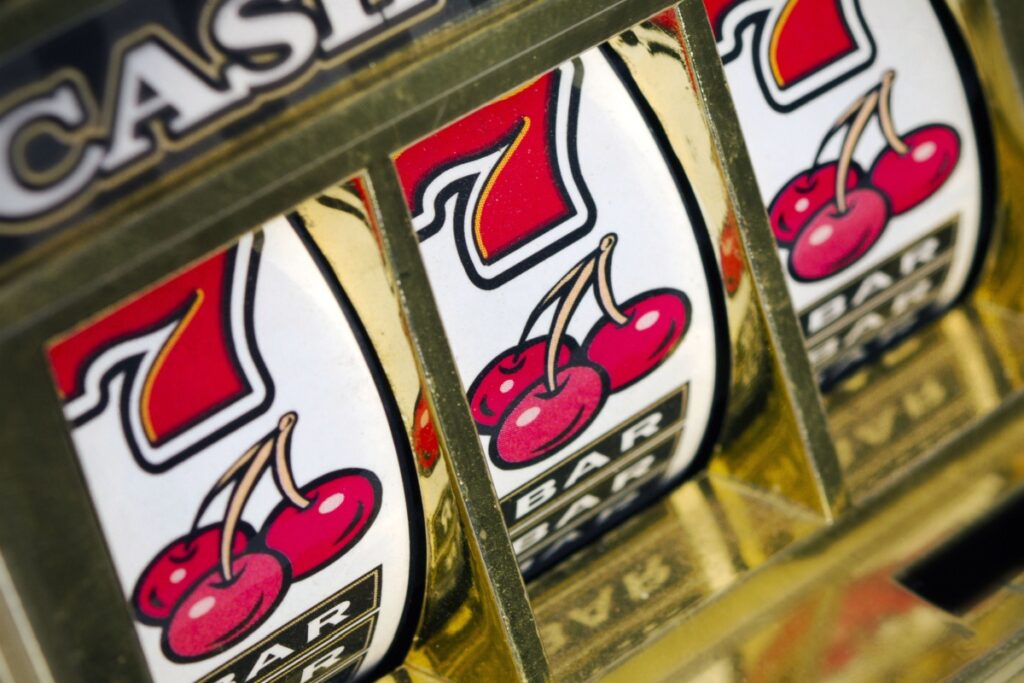
Key Points White Hat partners with Gaming Arts for U.S. land-based casinos Omnichannel deal blends online and retail gaming experiences Partnership expands White Hat’s U.S. market presence in 2025 White Hat Studios, a leading online gaming content provider, has entered the U.S. land-based casino market through a partnership with Gaming Arts, a supplier of casino gaming technology. This marks the company’s first expansion into physical casinos, moving beyond its digital platforms. White Hat is among the top three U.S. online gaming providers by gross gaming revenue. It offers over 150 games, licensed in all seven U.S. states with regulated online gaming. It received the top new supplier award at the 2025 EKG Slot Awards, reflecting its industry standing. The new partnership will distribute White Hat’s online content to casino floors starting in 2025. Partnership viewed as mutually beneficial The agreement enables White Hat Studios to supply games to Gaming Arts’ network of U.S. casino partners. It also allows select Gaming Arts’ land-based games to launch on White Hat’s online platforms. This omnichannel approach integrates online and retail gaming for a consistent player experience. Greg Colella, Gaming Arts’ Chief Product Officer, noted that White Hat’s content performs well across multiple states. This follows White Hat’s agreements to provide its Player Account Management platform to Potawatomi Casino Hotel in Wisconsin and Desert Diamond Casinos in Arizona. The partnership supports both companies’ growth in the expanding U.S. gaming market. CEO Andy Whitworth described the partnership as a significant milestone, aimed at delivering quality content to casinos and expanding White Hat’s U.S. presence. White Hat Studios’ chance to expand its US market presence The U.S. online gaming market is projected to reach $103 billion in 2025 and several online gaming providers are entering the land-based casino sector. Thus, the partnership with Gaming Arts’ casino network increases White Hat’s chances to grab a larger market share by positioning White Hat to compete with established casino operators while maintaining its online gaming expertise. White Hat’s strategy also integrates digital and retail gaming to align with industry trends. The company designs games based on player data to meet market demands, separating themselves from competitors that are order-of-the-shelf-type providers. Bigger game selection for partner casino players The partnership equips Gaming Arts’ casino partners with modern content comparable to online platforms. With access to White Hat’s game portfolio, they diversify their slot offering to US players. As part of this offering, White Hat offers a unique progressive jackpot system that includes over 40 games. White Hat’s game development draws on its experience with operators like DraftKings and BetMGM. Players can access White Hat’s games in both online and retail casino environments, broadening gaming options for players within Gaming Art’s casino network across the U.S.. White Hat Studios looking forward White Hat Studio launched in 2021, and its presence in online operations and land-based casinos positions continues to show growth. This expansion in collaboration with Gaming Arts integrates online and retail gaming, marking a new phase for the company. With the new partnership in place and additional game releases planned to debut in late 2025, the company is in a good position to become a significant U.S. gaming provider. Source link





